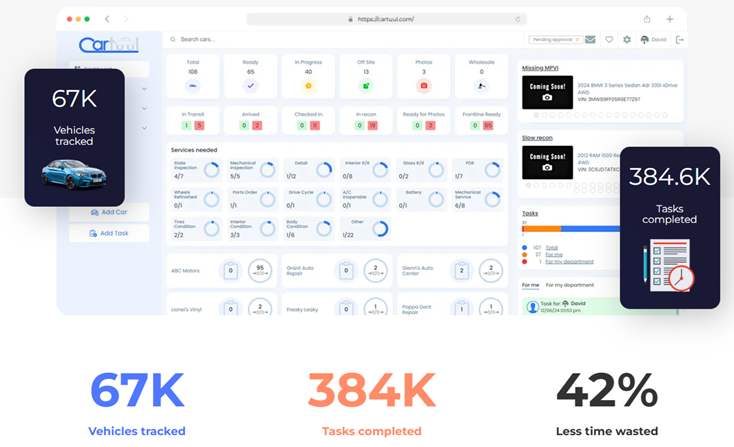In recent years, automation has made a huge impact across various industries, and the car dealership sector is no exception. With advancements in technology, dealerships are now able to streamline their operations, enhance customer engagement, and improve their bottom line—all through automation. Let’s explore how automation is revolutionizing the car dealership industry and what it means for both dealerships and customers.
1. Automated Systems for Customer Interactions
 One of the most noticeable changes is the way dealerships are handling customer inquiries. Traditionally, sales teams would be overwhelmed by phone calls, emails, and messages, leading to delays in response time. Now, automated systems are stepping in to take care of these routine tasks. By taking care of these repetitive tasks, sales teams have more time to focus on engaging with serious buyers, building relationships, and closing sales. AI-powered solutions like DriveCentric can even automate test drive scheduling and reminders, ensuring that no potential customer slips through the cracks. (Source: DriveCentric)
One of the most noticeable changes is the way dealerships are handling customer inquiries. Traditionally, sales teams would be overwhelmed by phone calls, emails, and messages, leading to delays in response time. Now, automated systems are stepping in to take care of these routine tasks. By taking care of these repetitive tasks, sales teams have more time to focus on engaging with serious buyers, building relationships, and closing sales. AI-powered solutions like DriveCentric can even automate test drive scheduling and reminders, ensuring that no potential customer slips through the cracks. (Source: DriveCentric)
2. Pricing Tools for Competitive Advantage
 Pricing is a huge factor in the car-buying decision process. In the past, pricing was often manually adjusted, which could be slow and inefficient, especially when market conditions changed. Today, dealerships are using pricing tools with automated alerts to adjust prices based on real-time market data. Tools like the ones offered by Dealerslink allow dealerships to price vehicles accurately and competitively, ensuring they remain attractive to potential buyers. This pricing flexibility helps dealerships stay ahead of the competition and maximize their profits, all while offering fair and consistent prices to customers. (Source: Dealerslink)
Pricing is a huge factor in the car-buying decision process. In the past, pricing was often manually adjusted, which could be slow and inefficient, especially when market conditions changed. Today, dealerships are using pricing tools with automated alerts to adjust prices based on real-time market data. Tools like the ones offered by Dealerslink allow dealerships to price vehicles accurately and competitively, ensuring they remain attractive to potential buyers. This pricing flexibility helps dealerships stay ahead of the competition and maximize their profits, all while offering fair and consistent prices to customers. (Source: Dealerslink)
3. Automating Dealership Operations with Cartuul
Cartuul makes dealership operations easier by automating and streamlining the entire reconditioning process, from when a car is purchased to when it’s sold. It automates key tasks and status updates, ensuring that dealerships always know exactly what has been completed and what still needs attention. The task management system automatically assigns tasks, tracks progress, and sends reminders, ensuring that each step of the reconditioning process is completed on time. With Cartuul, dealerships can automate scheduling and workflow, significantly reducing manual oversight and administrative burden. Dealerships that get their cars to the frontline faster are more profitable and successful, and Cartuul helps achieve that by providing a real-time, automated overview of where each car is in the process and what needs to happen next. It also automatically flags any bottlenecks or delays in the process, helping dealerships optimize their workflow and get cars to market faster. By automating these critical tasks, Cartuul ensures efficiency, faster turnarounds, and higher profitability.. (Source: Cartuul)

Conclusion
As the car dealership industry continues to embrace automation, the benefits are clear. Dealerships are able to run more efficiently, stay competitive in pricing, and provide better service to customers—all while saving time and reducing costs. Automation tools like Dealerslink, DriveCentric, and Cartuul are at the forefront of this transformation, helping dealerships automate processes such as pricing adjustments, customer interactions, and inventory management. These platforms allow dealerships to streamline operations, improve workflow, and enhance customer satisfaction by automating routine tasks and providing real-time updates. By adopting automation tools, dealerships not only keep up with the competition but also stay ahead of the curve, optimizing their resources and maximizing profitability. Automation is no longer just a trend—it’s a necessity for success in the evolving dealership landscape.
